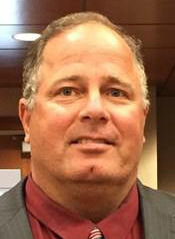A three-way race to fill the seat of retiring Circuit Court Judge Gray Silver III is shaping up in the 23rd Circuit – which encompasses Morgan, Berkeley and Jefferson counties.

Judge David Camilletti
The three candidates vying for the seat so far are Family Court Judge David Camilletti, Falling Waters attorney Kimberly Crockett and Martinsburg attorney Steven Redding.
The seat was opened up when Judge Silver announced his retirement last month. West Virginia Governor Jim Justice then announced that he was accepting applications to fill the vacant seat – with a deadline of January 24.

Attorney Kimberly Crockett
Governor Justice said that interviews would be held on February 15 and 16 in Charleston. One of those applicants will be appointed to fill the seat by the end of February, and will hold it until the election on May 8.
That means someone will be running for the seat on May 8 as an incumbent – albeit an incumbent who would have held the seat for two months or less.
In May 2000, Judge Silver defeated Camilletti for the seat by 30 votes. Judge Silver went on to be re-elected to two additional eight year terms – in 2008 and 2016.
The current salary for a Circuit Court Judge in West Virginia is $126,000 – although the West Virginia legislature is considering boosting that to $142,000 by 2021.

Attorney Steven Redding
In addition to the election to fill Judge Silver’s seat, there will be an election on May 8 to fill the seat of the late Judge John Yoder, who passed away in June 2017 due to complications from heart surgery.
Judge Debra McLaughlin and attorney David Hammer are vying for that seat.
The public affairs television show This Week in Morgan County with Russell Mokhiber is scheduled to interview the candidates on February 19 at the Ice House in Berkeley Springs.
Although the upcoming May election is a primary election, it is the final and only election for judges this year.
Camilletti is currently a judge for the 24th Circuit Family Court, a position he was appointed to in July 2015.
For the 33 years prior, he worked as an attorney, primarily in West Virginia, after graduating from West Virginia University’s law school in 1982.
Born in Morgantown and raised in Wheeling, Camilletti followed in the footsteps of his father and grandfather by pursuing a career in law.
He spent the bulk of his years as a sole practitioner but also joined law firms on occasion.
Although he worked in Morgantown and the Charleston area early in his career, he moved to the eastern panhandle in 1992 for the economic opportunity and never left.
Camilletti believes he was destined to become an attorney.
“I never really saw another pathway,” he said. “Nothing else appealed or suggested itself to me, but I could see the kind of lawyer I would become as early as kindergarten. I was the kid standing up for the other kids when I saw wrongdoing. Somebody had to take a stand and say you – can’t do that to that person – and that somebody was me and remained me all the way through college.”
Camilletti said he served as a generalist throughout his career.
“I learned to write a deed, will and an appeal because that’s what my clients needed,” Camilletti said.
Camilletti said he didn’t become a lawyer to become a judge.
“But this has been my natural pathway for at least the last 18 years,” he said. “Since I ran in 2000 against Gray Silver, it has been a part of my plan to get into the judiciary. Other things have intervened in my life but my opportunity finally came when I was appointed to family court judge. The death of my friend John Yoder and the retirement of my friend Gray Silver have given me an opportunity I cannot pass up. The time is right now to run for Circuit Court judge.”
Camilletti believes serving in his current position has helped prepare him for the next level.
“Having been a judge in Family Court, which handles divorces, custody, child support enforcement and domestic violence, I have made the transition from zealous lawyer advocate to a more deliberate study of each person’s dilemma,” Camilletti said.
“When I first became a judge, they told me to forget about being a lawyer, to stop being and thinking like one and put distance between myself and my lawyer ways. Just as it was important as a new judge to step away from being a lawyer, it’s been important for me as a judge to step away from all the other types of civil and criminal work that I have done so that as I work up to the circuit court, I can perform that work from a judicial view and not a lawyer’s view.”
